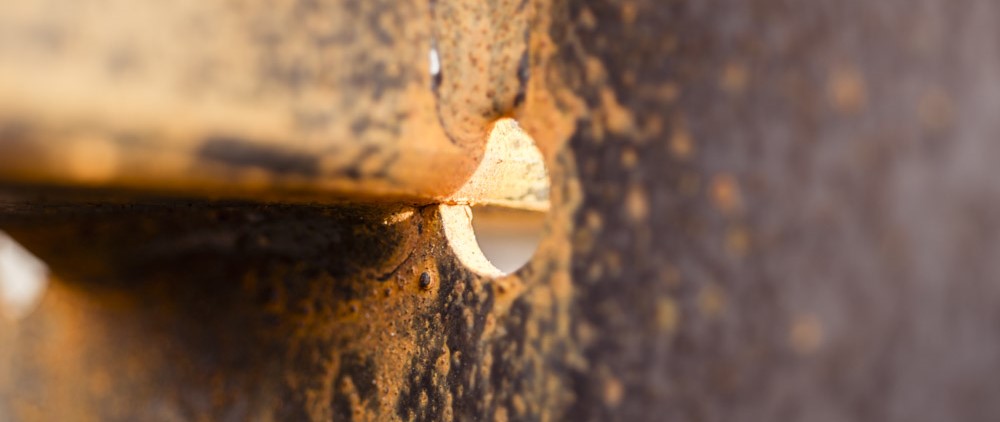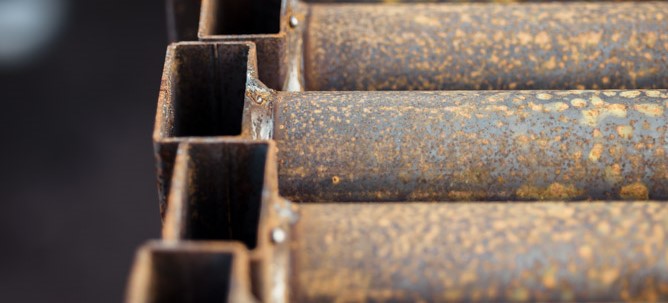The cost of corrosion
If your steel structures corrode, it’s not just financial costs you need to be aware of. It can also cost the environment and the health and safety of individuals.
We explore the costs associated with rusted steel on a personal and global level, and what can be done to mitigate these costs.

How much does rust cost to fix?
If left untreated, steel will inevitably corrode from elements such as oxygen, moisture, or chemicals. However, the speed at which steel corrodes can heavily impact global financial resources.
It is estimated that, globally, one tonne of steel will turn to rust every 90 seconds. Following a steady rate, that’s over 350,000 tonnes of steel in a year. This is a huge amount of steel to lose; it is estimated that corroded steel accounts for nearly 4% of Gross Domestic Product (GDP) lost every year.
From a global perspective, this has huge repercussions across many different sectors. Resources need to be used to manage, repair, or replace corroded infrastructure and equipment. This is a substantial financial burden, diverting funds away from other areas.
Costs to businesses
There are direct and indirect costs associated with steel corrosion for both individuals and businesses. The most immediate financial impact of corrosion is the cost of repairing or replacing damaged equipment and structures. This includes the cost of materials, maintenance and repair, and production downtime.
Indirect costs may include the inefficient running of machinery and other equipment due to corrosion. This can lead to higher energy consumption and increased operational costs.

Environmental cost of rust
It’s not just financial costs that are created from rusting steel – corroded steel can also harm the environment. CO² is emitted from corroded steel, with estimates of 1.6-3.2% of global CO² emissions being attributed directly to corroded steel.
If steel is particularly rusty, it may not be salvageable and safe to reuse. A new structure would need to be fabricated to replace it, but the steel fabrication process can be harmful to the environment. It has been estimated that new steel production accounts for 11% of all CO² emissions worldwide, contributing to climate change. Additionally, new steel fabrication requires raw materials, contributing to resource depletion and environmental degradation from mining and manufacturing processes.
Operational costs and safety risks
Machinery used in businesses across all kinds of sectors may become corroded, causing downtime, or slowed production lines. Downtime can also be extended to the unexpected failures of steel infrastructure, causing sudden downtime that can may impact finances and customer trust.
Health and safety can also be seriously compromised by corrosion; this may be especially true with load bearing steel infrastructure such as bridges and buildings. The failure of these fabrications can lead to catastrophic failures, endangering lives and causing serious injuries.
Save costs with hot dip galvanizing
There are many different costs associated with the corrosion process, but these can all be reduced by using a corrosion-resistant steel coating.
Hot dip galvanizing is a steel protection service that extends the lifespan of steel, allowing it to remain maintenance-free for multiple decades. In some circumstances, galvanized steel can last for over a century. Its extended lifespan for steel reduces financial impact by reducing the need for maintenance, refabrication, and recoating.
It’s not just financial costs you can save with hot dip galvanizing. It’s also a sustainable choice for coating steel, reducing environmental impact from logistics, refabrication, and emissions from corroded steel.
When you choose Joseph Ash Galvanizing, you can be sure you’ll receive a high quality finish from our friendly team that understands your unique requirements.
- We’ll collect and deliver your steel to our site ✔️
- Comprehensive technical support, guidance and assistance at every stage ✔️
- Fast turnaround times ✔️
- Hot dip galvanized to BS EN ISO 1461 standards ✔️
- Part of a circular economy ✔️